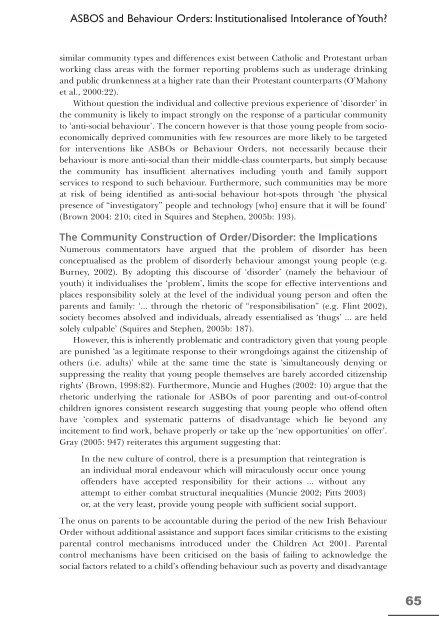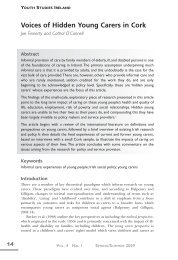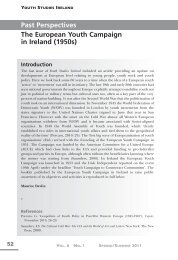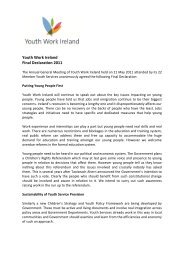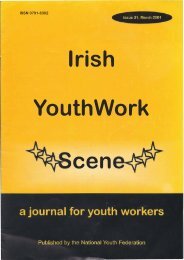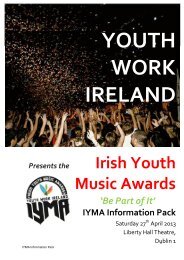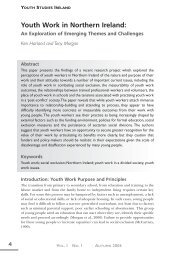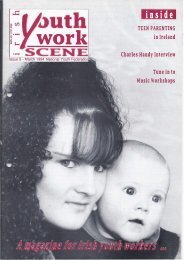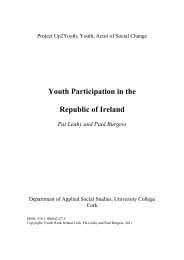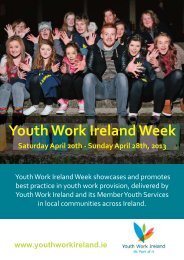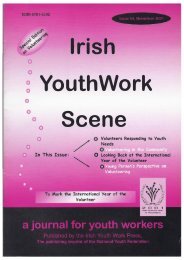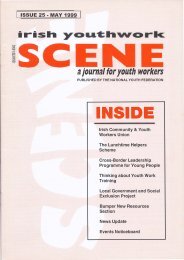YOUTH STUDIES IRELAND<strong>Youth</strong>, Public Space and Perceptions of DisorderTo compound the existing relative absence of power amongst young people identifiedabove, they also experience a disadvantaged position by nature of their ‘publiclifestyle’. <strong>Youth</strong>s hanging out on the street infringe community expectations of whatconstitutes appropriate social behaviour (Kelling, 1987). Burney (2002:73) argues thatyoung people hanging about ‘have become the universal symbol of disorder and,increasingly, menace’. Even if not engaged in illegal behaviour their activities may beperceived as disrupting the ‘order’ of the community. Worrall (1997:138) documentsthe scenario for young people whereby ‘respectable citizens and figures of authority ...are increasingly demanding that they be known about, watched and moved on’.Studies of offending youth in Northern <strong>Ireland</strong> found that many lived out their dailyroutine on the public stage of the street corners and public parks of their communities(Ellison, 2001; Seymour, 2003). In one of the studies, over one-third of offending youthwho consumed alcohol said they drank in public places such as parks, the streets andstreet corners in their own community. It was therefore not difficult to conclude thatthe location of young people’s drinking, as much as the consumption of alcohol itself,had the potential to be perceived as problematic and disorderly by the community(Seymour, 2003).James et al. (1998: 39) argue that ‘social space is never a merely neutral location’.This resonates with the argument of Brewer et al. (1997: 136) that young people areassociated with most visible crimes and other visible problems in the community,thereby ‘raising people’s sense that young people are behind most ordinary crime’.Crawford (1999b) suggests that there is an assumption in the community that dangeroccupies public, not private space. Young people living in poor and sometimesovercrowded housing, expelled from school, youth and community facilities have littlechoice but to occupy public space. In this sense they are a marginal group and areperceived as dangerous or at least as having the potential to create disorder (Crawford,1999b). It is not so much that the marginal member of society is seen as intimidatingbut rather it is ‘the visible presence of marginal people within prime space thatrepresents a threat to a sense of public order and orderliness’ (Wardhaugh, 2000:113)Constructions of Order/Disorder: Variance across CommunitiesCrime and disorder have an impact on individuals in communities to varying degreesand in different ways (Crawford, 1999b; Loader et al., 1998). The level of (in)toleranceis likely to vary depending on a number of factors including one’s relationship to thecommunity and one’s perception and experience of ‘disorder’ in the area. Loader etal. (1998) argue that those with a stake in the community, for example a business orfamily links, are more likely to want to elicit a response to disorder than individualstemporarily living in the area. Similarly, Young (1999:121–2) highlights attempts toevoke a sense of nostalgia for the secure past as a factor in the demand for a quick fix,all-embracing solution to crime and disorder ‘in order to conjure back the securestreets and backyards of childhood memories’. Results from the Northern <strong>Ireland</strong>Community Crime Survey (O’Mahony et al., 2000) illustrate that wide disparities existbetween how respondents in working-class urban communities rate crime and disorderproblems in their community compared to middle class and rural respondents.However, it is also reported that perceptions of anti-social behaviour vary within64 VOL. 1 NO. 1 AUTUMN 2006
ASBOS and Behaviour Orders: Institutionalised Intolerance of <strong>Youth</strong>?similar community types and differences exist between Catholic and Protestant urbanworking class areas with the former reporting problems such as underage drinkingand public drunkenness at a higher rate than their Protestant counterparts (O’Mahonyet al., 2000:22).Without question the individual and collective previous experience of ‘disorder’ inthe community is likely to impact strongly on the response of a particular communityto ‘anti-social behaviour’. The concern however is that those young people from socioeconomicallydeprived communities with few resources are more likely to be targetedfor interventions like ASBOs or Behaviour Orders, not necessarily because theirbehaviour is more anti-social than their middle-class counterparts, but simply becausethe community has insufficient alternatives including youth and family supportservices to respond to such behaviour. Furthermore, such communities may be moreat risk of being identified as anti-social behaviour hot-spots through ‘the physicalpresence of “investigatory” people and technology [who] ensure that it will be found’(Brown 2004: 210; cited in Squires and Stephen, 2005b: 193).The Community Construction of Order/Disorder: the ImplicationsNumerous commentators have argued that the problem of disorder has beenconceptualised as the problem of disorderly behaviour amongst young people (e.g.Burney, 2002). By adopting this discourse of ‘disorder’ (namely the behaviour ofyouth) it individualises the ‘problem’, limits the scope for effective interventions andplaces responsibility solely at the level of the individual young person and often theparents and family: ‘... through the rhetoric of “responsibilisation” (e.g. Flint 2002),society becomes absolved and individuals, already essentialised as ‘thugs’ ... are heldsolely culpable’ (Squires and Stephen, 2005b: 187).However, this is inherently problematic and contradictory given that young peopleare punished ‘as a legitimate response to their wrongdoings against the citizenship ofothers (i.e. adults)’ while at the same time the state is ‘simultaneously denying orsuppressing the reality that young people themselves are barely accorded citizenshiprights’ (Brown, 1998:82). Furthermore, Muncie and Hughes (2002: 10) argue that therhetoric underlying the rationale for ASBOs of poor parenting and out-of-controlchildren ignores consistent research suggesting that young people who offend oftenhave ‘complex and systematic patterns of disadvantage which lie beyond anyincitement to find work, behave properly or take up the ‘new opportunities’ on offer’.Gray (2005: 947) reiterates this argument suggesting that:In the new culture of control, there is a presumption that reintegration isan individual moral endeavour which will miraculously occur once youngoffenders have accepted responsibility for their actions ... without anyattempt to either combat structural inequalities (Muncie 2002; Pitts 2003)or, at the very least, provide young people with sufficient social support.The onus on parents to be accountable during the period of the new Irish BehaviourOrder without additional assistance and support faces similar criticisms to the existingparental control mechanisms introduced under the Children Act 2001. Parentalcontrol mechanisms have been criticised on the basis of failing to acknowledge thesocial factors related to a child’s offending behaviour such as poverty and disadvantage65
- Page 2:
YOUTH STUDIES IRELANDEditorial‘Yo
- Page 5 and 6:
Youth Work in Northern IrelandStruc
- Page 8:
YOUTH STUDIES IRELANDThese principl
- Page 11 and 12:
Youth Work in Northern IrelandMany
- Page 13 and 14: Youth Work in Northern Irelandthe d
- Page 15 and 16: Youth Work in Northern IrelandA fur
- Page 17 and 18: Youth Work in Northern IrelandAckno
- Page 19 and 20: YOUTH STUDIES IRELANDYouth, Governa
- Page 21 and 22: Youth, Governance and the Citycommu
- Page 23 and 24: Youth, Governance and the Cityor be
- Page 25 and 26: Youth, Governance and the Cityunemp
- Page 27 and 28: Youth, Governance and the CityCase
- Page 29 and 30: Youth, Governance and the CityIn mo
- Page 31 and 32: Youth, Governance and the CityConcl
- Page 33 and 34: Youth, Governance and the City11 Ta
- Page 35 and 36: Youth, Governance and the CityBreat
- Page 37 and 38: Youth, Governance and the CityKelli
- Page 39 and 40: Youth, Governance and the CityWhela
- Page 41 and 42: Addressing Youth and Being Youngpro
- Page 43 and 44: Addressing Youth and Being YoungWit
- Page 45 and 46: Addressing Youth and Being YoungThe
- Page 47 and 48: Addressing Youth and Being Young‘
- Page 49 and 50: Addressing Youth and Being Youngdra
- Page 51 and 52: Addressing Youth and Being Youngwhe
- Page 53 and 54: Addressing Youth and Being Youngwho
- Page 55 and 56: Addressing Youth and Being Young12
- Page 57 and 58: Addressing Youth and Being YoungDe
- Page 59 and 60: Addressing Youth and Being YoungMcW
- Page 61 and 62: YOUTH STUDIES IRELANDASBOs and Beha
- Page 63: ASBOS and Behaviour Orders: Institu
- Page 67 and 68: ASBOS and Behaviour Orders: Institu
- Page 69 and 70: ASBOS and Behaviour Orders: Institu
- Page 71 and 72: ASBOS and Behaviour Orders: Institu
- Page 73 and 74: ASBOS and Behaviour Orders: Institu
- Page 75 and 76: ASBOS and Behaviour Orders: Institu
- Page 77 and 78: YOUTH STUDIES IRELANDTraveller Chil
- Page 79 and 80: Traveller Children and Education: P
- Page 81 and 82: Traveller Children and Education: P
- Page 83 and 84: Traveller Children and Education: P
- Page 85 and 86: Traveller Children and Education: P
- Page 87 and 88: Traveller Children and Education: P
- Page 89 and 90: Traveller Children and Education: P
- Page 91 and 92: Traveller Children and Education: P
- Page 93 and 94: Review ArticleReview ArticleSignifi
- Page 95 and 96: Review Articleis Social Care?’ an
- Page 97 and 98: Review ArticleShort Note on a Funda
- Page 99 and 100: ReviewReviewYouth Work Liaison Foru
- Page 101 and 102: Reviewdevelopments in areas related
- Page 103 and 104: 103


